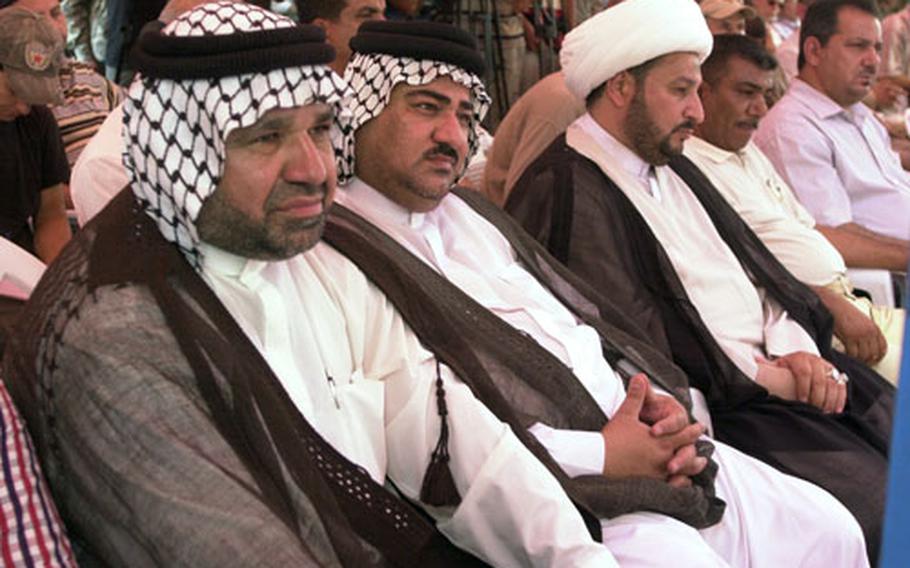
A small crowd of U.S. Army officials, Iraqi government representatives and sheiks from Sadr City listen as Gen. Abud Kambar al-Malliki, the top Iraqi army commander in Baghdad, warned terrorists to “stay in your homes” or face a fight from Iraqi forces as U.S. troops pull back from Iraq’s cities at the end of June. The warning came minutes before the U.S. Army signed papers leaving Joint Security Station Sadr City to the 44th Iraqi Army Brigade, part of the 11th Iraqi Army Division. The transfer is one of dozens the Americans have made in recent weeks to comply with a June 30 deadline to move combat troops out of cities. (Teri Weaver / Stripes)
BAGHDAD — The top Iraqi army general in Baghdad warned terrorists Saturday to "stay in your homes" or face a fight as U.S. troops pull back from Iraq’s cities at the end of the month.
"We are ready to fight you if you try to attack our citizens," Gen. Abud Kambar al-Malliki said during a ceremony to mark the Americans’ departure from a base on the edge of Sadr City.
"Those who hide in dark holes, we are ready to have the earth shaking above your head," the general told a small crowd of U.S. Army officials, Iraqi government representatives and sheiks from Sadr City. "We will find you in every corner where you hide."
The general’s warning came minutes before the U.S. Army signed papers leaving Joint Security Station Sadr City to the 44th Iraqi Army Brigade, part of the 11th Iraqi Army Division. The transfer is one of dozens the Americans have made in recent weeks to comply with a June 30 deadline to move combat troops out of cities.
Many spoke Saturday of the move from Sadr City as historic, a symbol of violence that had ended. The city’s tenements, mainly full of Shiite residents, suffered during Saddam Hussein’s reign. After the March 2003 invasion, the area became the headquarters for Muqtada al-Sadr’s army, which fought for years against U.S. troops and the emerging Iraqi Security Forces.
The base was both a key staging ground for the fight and a target in 2007 and early 2008 before al-Sadr called for a cease-fire. Since then, the Americans have built a wall separating the larger northern part of the city and turned over security enforcement to Iraqi military officials.
During the fighting, 136 U.S. troops and 184 Iraqi security forces members were killed or wounded, according to Maj. Gen. Daniel Bolger, who commands all U.S. troops in and around Baghdad. More than 3,000 civilians were killed or injured during those years, he said.
"Fighting here was fierce and deadly," said Bolger, commander of the 1st Cavalry Division and Multi-National Division—Baghdad. "Thank God the worse of that has passed."
Some, like Mohammed al-Lami, however, are worried that the violence is not over.
"I think it’s going to be worse," he said of the days following the June 30 deadline.
Al-Lami runs one of the biggest markets in Sadr City, just south of the barrier the Americans call the "Gold Wall." He said business is good in his market and that projects to improve infrastructure south of the wall have improved living conditions.
But many more improvements are needed, especially north of the wall, he said. "They need it very bad," he said through a translator before the ceremony began.
The U.S. Army is trying to funnel reconstruction money into the city, even though it is prohibited from entering most of it. In recent weeks, even as the Americans made plans to move, civil affairs officers and State Department officials have been meeting with representatives from the closed part of the city.
Some initial projects — such as setting up health clinics and safety training for the part of Sadr City south of the wall — have been received well, said Lt. Col. Maria Zumwalt, who oversees most of the military reconstruction projects in the area.
The U.S. still has two bases in the Sadr City area. Its portion of JSS Comanche will close this week. JSS Ur, in the city’s northeast corner, will remain open.
Inside Sadr City, and around Baghdad, Iraqi troops are ready, al-Malliki said.
"We are ready to fight you if you try to attack our citizens," he warned militants.
Bolger agreed. "This part of the Iraqi army is strong," he said of the troops in Sadr.
But he also said U.S. troops would come back into the city to respond to violence if requested by the Iraqi government.
"Our enemy can surprise us," he said. "Our goal is to be ready."